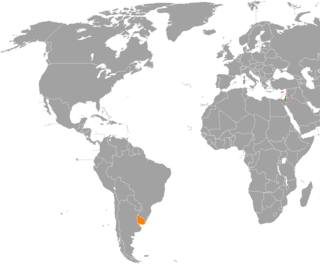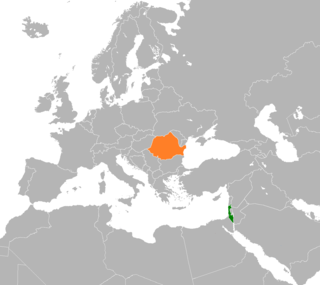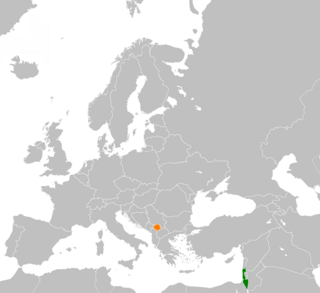
Foreign relations of Israel refers to diplomatic and trade relations between Israel and other countries around the world. Israel has diplomatic ties with 164 of the other 192 UN member states as of December 2020. Israel is a member of the United Nations (UN) and a number of other international organisations. Israel maintains full diplomatic relations with two of its Arab neighbours, Egypt and Jordan, after signing peace treaties in 1979 and 1994 respectively. In 2020, Israel signed agreements establishing diplomatic relations with four Arab League countries, Bahrain, the United Arab Emirates, Sudan and Morocco. As of 2021, Israel had formal diplomatic relations with 168 other countries, while twenty-eight UN member states have either never established, or have broken off diplomatic relations with Israel.

The status of Jerusalem has been described as "one of the most intractable issues in the Israeli–Palestinian conflict" due to the long-running territorial dispute between Israel and the Palestinians, both of which claim it as their capital city. Part of this issue of sovereignty is tied to concerns over access to holy sites in the Abrahamic religions; the current religious environment in Jerusalem is upheld by the "Status Quo" of the former Ottoman Empire. As the Israeli–Palestinian peace process has primarily navigated the option of a two-state solution, one of the largest points of contention has been East Jerusalem, which was part of the Jordanian-annexed West Bank until the beginning of the Israeli occupation in 1967.

Gideon Greif is an Israeli historian who specializes in the history of the Holocaust, especially the history of the Auschwitz concentration camp and particularly the Sonderkommando in Auschwitz. He served as a visiting lecturer for Jewish and Israeli History at the Schusterman Center for Jewish Studies at the University of Texas at Austin during the academic year 2011–2012. He headed a commission that issued a report in July 2021 that denied that the killing of Bosnian Muslims at and around Srebrenica in July 1995 constituted genocide.

A bilateral relationship exists between Armenia and Israel. From 1993 to 2007, Armenia was served by the Embassy of Israel in Georgia. In 1996, Tsolak Momjian was appointed the honorary consul of Armenia in Jerusalem. Eleven years later, the residence of the Embassy of Israel in Armenia was moved to Jerusalem. In October 2010, Shmuel Meirom was appointed the Israeli ambassador to Armenia. Armen Melkonian was appointed the Armenian ambassador to Israel in 2012, with a residence in Cairo. In October of that year, Melkonian presented his credentials to Israeli President Shimon Peres. On 21 September 2019 Armenia announced that it would be opening an embassy in Israel. Despite generally cordial ties between the two, relations soured after Armenia withdrew its ambassador to Israel due to Israeli arms supply to Armenia's enemy, Azerbaijan, in the 2020 Nagorno-Karabakh War.

British – Serbian relations are foreign relations between the United Kingdom and Serbia. Both countries established diplomatic relations in 1837. The UK has an embassy and consulate in Belgrade and Serbia has an embassy in London. The Serbian ambassador to the United Kingdom is Dr Dejan Popovic and the British ambassador to Serbia is Sian MacLeod.

Mexico–Serbia relations are the diplomatic relations between Mexico and Serbia. Both nations were founding members of the Group of 77 and the United Nations.

Full diplomatic relations between Croatia and Israel were established on April 9, 1997 following Croatia's independence from SFR Yugoslavia. Croatia has an embassy in Tel Aviv and honorary consulates in Ashdod, Caesarea, Jerusalem and Kfar Shmaryahu. Israel has an embassy in Zagreb. Relations between the two countries are described as friendly and highly cooperative. In recent years, Croatia and Israel intensified bilateral relations and cooperation in the field of defence and security. Croatia is one of the countries Israel occasionally turns to inside the EU to advocate on its behalf and it generally abstains or votes with Israel on key EU votes at the UN. Israeli president Reuven Rivlin described Croatia in 2019 as "Israel's strong ally in the EU, the UN and other multilateral organizations."

Israel–Uruguay relations are foreign relations between Israel and Uruguay. Uruguay was the first South American country and the fourth in the world to recognize Israel.

Albania has recognized Israel as a state since April 19, 1949. Diplomatic relations between the countries were established on August 19, 1991. Albania has an embassy in Tel Aviv and Israel has an embassy in Tirana.

Israel and Spain have maintained diplomatic ties since 1986. Israel has an embassy in Madrid. Spain has an embassy in Tel Aviv, and an honorary consulate in Haifa. There is also a General Consulate in Jerusalem, which serves as a diplomatic mission to the city of Jerusalem, Gaza and the territories of the West Bank. In addition to both countries being member states of the United Nations, both countries are members of the Union for the Mediterranean.

Georgia–Israel relations are diplomatic, commercial and cultural ties between Georgia and Israel. Diplomatic relations were formally established on June 1, 1992, alongside establishing diplomatic relations with the US. Georgia has an embassy in Tel Aviv and a consulate in Jerusalem. Israel has an embassy in Tbilisi.

Israel–Romania relations are foreign relations between Israel and Romania. The two nations established diplomatic relations on 11 June 1948. Israel has an embassy in Bucharest. Romania has an embassy in Tel Aviv and a general consulate in Haifa, and 2 honorary consulates. The two have signed treaties and agreements and both are full members of the Union for the Mediterranean.

Bilateral foreign relations exist between Austria and Israel.

Israel–North Macedonia relations refer to the bilateral political relations between Israel and North Macedonia. North Macedonia has an embassy in Tel Aviv. Israel does not have a resident ambassador.

Israel–Kosovo relations refer to bilateral relations between Israel and Kosovo. Kosovo declared its independence from Serbia on 17 February 2008. Israel and Kosovo agreed on 4 September 2020, as part of negotiations for the Kosovo and Serbia Economic Normalization agreements, to mutually recognize each other. It was initially reported that the mutual recognition had not yet gone into effect at that point, and Israel's recognition of Kosovo was expected to be formally declared "in the coming weeks". However, on 21 September the ambassador of Israel to Serbia, Yahel Vilan, confirmed that Israel had indeed recognized Kosovo on 4 September 2020. The two countries established diplomatic relations on 1 February 2021. On 14 March 2021 Kosovo officially opened its Embassy in Jerusalem.

The Palestinian–Serbian relations are bilateral relations between the State of Palestine and the Republic of Serbia. Relations between Serbia and Palestine have been very close and friendly.

The State of Israel was formally established by the Israeli Declaration of Independence on 14 May 1948, and was admitted to the United Nations (UN) as a full member state on 11 May 1949. As of December 2020, it has received diplomatic recognition from 165 of the 193 total UN member states, and also maintains bilateral ties with all of the Permanent Five. 28 member states have either never recognized Israel or have withdrawn their recognition; others have severed diplomatic relations without explicitly withdrawing their recognition. Additionally, many non-recognizing countries have challenged Israel's existence—predominantly those in the Muslim world—due to significant animosity stemming from the Israeli–Palestinian conflict and the Arab–Israeli conflict.

The Kosovo and Serbia economic normalization agreements, informally known as the Washington Agreement, are a pair of documents in which Kosovo and Serbia agreed to facilitate economic normalization among themselves. The documents were signed by the Prime Minister of Kosovo Avdullah Hoti and the President of Serbia Aleksandar Vučić on September 4, 2020, at the White House, in the presence of the President of the United States Donald Trump.

Israel–Yugoslavia relations were historical foreign relations between Israel and now split-up Socialist Federal Republic of Yugoslavia. Positive initial relations between the two states were subsequently negatively affected by the Arab–Israeli conflict and close relations between Yugoslavia and some Arab states, particularly Yugoslav relations with Egypt. Despite cancelation of the formal relations after the Six-Day War informal, commercial and cultural exchanges continued throughout the Cold War period.




























